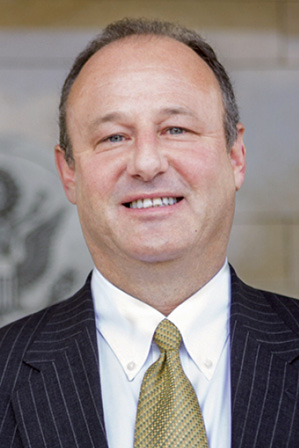Progress and New Priorities
President’s Views
BY ERIC RUBIN

This is my first monthly column, and I want to start by thanking my fellow AFSA members for supporting me and the other members elected to our new board this summer. I am grateful for your confidence, and I will do my best to keep it. I also know that the challenges we face are not going to be easy.
First, the good news: our new leadership team at AFSA has established a positive and constructive working relationship with the Director General, Ambassador Carol Perez, and her principal deputy, Ambassador Ken Merten. There is already progress to report.
For State Department officers and specialists, the Fair Share requirement for bidding was eliminated, although it remains in some promotion precepts. We will work with State management to ensure this change is reflected in all policy documents and SOPs. And we will work with management to ensure that the Professional Development Program will not derail career advancement for our members.
Thanks to a shared intensive effort, State is making significant changes to the Special Needs Education Allowance program and to the entire approach to Foreign Service families with special needs children.
The June ALDAC cable made clear that the primary goal will be to help Foreign Service members serve overseas and to meet the needs of FS children. What many saw as a “gotcha” approach from the Bureau of Medical Services is, we hope, now being replaced with a “How can we help you serve overseas?” attitude.
Obviously, implementation will be critical. We will continue to monitor this closely and work with MED on other issues of concern.
Getting more Foreign Service members out into the field is going to be our biggest priority in the coming months. We are working with the leadership of our agencies, pressing them to move the positions being cut from Iraq and Afghanistan back to the posts from which many of them were taken in the previous decade. If the “Iraq (and Afghanistan) tax” is going to be a thing of the past, we cannot and must not simply use the reductions in these posts (and others) as a cost-saving measure, or to add jobs in Washington, D.C.
The Foreign Service is needed in the field. Our members want to serve overseas: that is why they joined the Service in the first place. If we are going to meet the challenges of a resurgent China—which is ramping up its diplomatic presence in almost every country—and address our other critical national security challenges, we can’t do it without adequately staffing our missions overseas.
A shortage of opportunities to serve overseas also has a direct negative impact on promotion eligibility and critical skills development necessary to create Foreign Service leaders of the future. The shift of positions from Iraq and Afghanistan offers us a once-in-a-generation chance to get this right.
I’ll be spending a lot of time on Capitol Hill this fall, briefing members and staff on budget needs and priorities, and encouraging continued support for full funding for the foreign affairs agencies. We made good progress this year, and the budget agreement approved by Congress and signed by the president is a big step forward.
Speaking of recruitment and hiring, none of our agencies is doing nearly well enough on diversity. The most recent numbers are discouraging: as of this past June, 81 percent of Foreign Service officers and 75 percent of specialists are white, while 59 percent of officers and 71 percent of specialists are men. The Senior Foreign Service is 89 percent white and 68 percent male.
Programs like the Pickering and Rangel Fellows and recruitment at diverse educational institutions are helping bring in Foreign Service classes that look more like America, but our senior ranks do not reflect this diversity.
We can do better. We must do better. To represent America in 2019, the Foreign Service must be representative of the country. AFSA stands ready to work with the leaders of all foreign affairs agencies to meet this challenge.
I welcome your views and suggestions on how AFSA can serve you better and advance our common goals more effectively.

